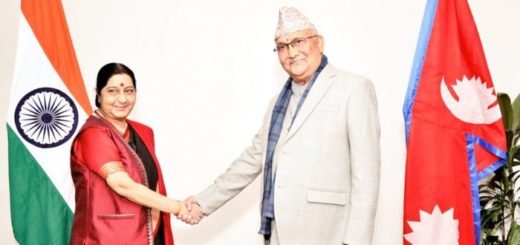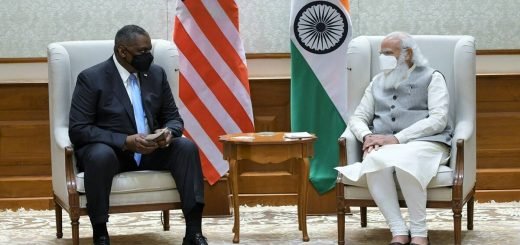Jerusalem: Reflection of world politics in Middle East
The U.S. would be the first country to have its embassy in Jerusalem. Logistically speaking, experts opine that the actual move may take 3-4 years. Prior 1980, many countries had their Embassies in Jerusalem. After a series of events, those countries moved their delegations out of the city choosing Tel Aviv. In 2006, Costa Rica and El Salvador were the last countries to do so. Now almost every country having diplomatic ties with Israel, including India have their Embassies in the city of Tel Aviv. – Shiva Shankar Pandian*
Recent happenings in the region apparently indicate that there is almost no other issue in the Middle East as petulant as the question of Jerusalem. Starting from the early 90’s till today it has remained as a contentious debate bankrupting peace talks and striking wars.
A crucial episode has resurfaced again over President Trump announcing his plans to recognize Jerusalem as the capital of Israel and moving U.S. Embassy from Tel Aviv to Jerusalem. To quote President Trump “My announcement today marks the beginning of a new approach to the conflict between Israel and the Palestinians.”

U.S. President Donald Trump holds up a proclamation that the U.S. government will formally recognize Jerusalem as the capital of Israel (Photo by Chip Somodevilla/Getty Images)
The hot ‘Jerusalem Embassy Act of 1995′
In 1995, under Clinton’s presidency, the U.S. Congress drafted the Jerusalem Embassy Act, urging the federal government to relocate the U.S. embassy to Jerusalem, also, in addition, recognize Jerusalem as Israel’s capital city. This act was passed by the then Congress by an overwhelming bipartisan majority, which is now reaffirmed by the Senate through a unanimous vote earlier this year.
But President Trump following the footpath of his predecessors for one single time, cited strategic reasons and American national interests, to sign a six-month waiver to stay put the American embassy in Tel Aviv, blocking the Jerusalem Embassy Act of 1995. As mentioned above three of his predecessors Bill Clinton, George W. Bush and Barack Obama, for over 20 years, citing same reasons made continuous waivers to the act.
Many of Trump’s predecessors also made this their campaign promise, yet sorting to waivers, they failed to implement it. Now that President Trump has made his official historic announcement, has marked a great strategic decision on Washington’s Middle East policy.
The U.S. would be the first country to have its embassy in Jerusalem. Logistically speaking, experts opine that the actual move may take 3-4 years. Prior 1980, many countries had their Embassies in Jerusalem. After a series of events, those countries moved their delegations out of the city choosing Tel Aviv. In 2006, Costa Rica and El Salvador were the last countries to do so. Now almost every country having diplomatic ties with Israel, including India have their Embassies in the city of Tel Aviv.
Is it a departure from Washington’s Israel Policy?
President Trump’s decision has for sure toppled nearly 70-year-old U.S. policy that has resisted recognizing Jerusalem as Israeli capital before the Israel-Palestine conflict is fixed.
Speaking in the White House’s Diplomatic Reception Room on Wednesday, President Trump assured that, this move was “not intended, in any way, to reflect a departure from America’s strong commitment to facilitating a lasting peace agreement, maintaining Washington’s commitment to a cornerstone of US foreign policy for decades”. Well, some experts may differ. Even though President Trump recognized Jerusalem as Israel’s capital, he explicitly didn’t signal that it is the whole of Jerusalem (undivided), he also made clear that this is “not a position of any final status issues, including the specific boundaries of the Israeli sovereignty in Jerusalem, or the resolution of contested borders.” So this leaves the door opened for Israelis and Palestinians to divide the city during any final border talks between the two sides.
The question of Jerusalem
The UN came up with a significant partition plan in 1947 recognizing the sacred city of Jerusalem as an “International City”. The following war left the city divided. When the war ended in 1949, an armistice line (aka Green Line) was drawn, whereby Israel took control of the Western Jerusalem and Jordan took the control of the Eastern part. Again during the 1967 Six-Day War, being captured by Israel, East Jerusalem came under Israeli occupation and control, which was then condemned internationally.
It is well-known fact that, both parties claim this sacred city as their own territory. Although Jerusalem is the seat of Israel’s parliament “Knesset” and their Supreme Court, they sit in the Western Jerusalem, a region Israel has controlled since 1949.
The international community recognizes East Jerusalem as an “occupied territory” and some recognize it as a part of Palestinian territory.
Palestinians are determined to officially divide the city and make the Eastern part as their capital of Palestinian state. To which the Israelis contest, the present right-wing government of Israel reiterated their position that they won’t consider making negotiations on borders of Jerusalem city.
International ramifications following President Trump’s announcement
Earlier this week President Trump discussed his plans separately with leaders in the Middle East including PM Benjamin Netanyahu of Israel, President Mahmoud Abbas of Palestine, King Abdullah of Jordan, President Abdel Fattah Al Sisi of Egypt, and King Salman Bin Abdulaziz Al Saud of Saudi Arabia. To which he is reported to have received a mixed response.
PM Netanyahu extended his support to President Trump’s decision moving their embassy, who grabbed on the occasion to call on other leaders to join President Trump in recognizing Jerusalem as Israel’s capital. “The President’s decision is an important step towards peace, for there is no peace that doesn’t include Jerusalem as the capital of the State of Israel,” President Netanyahu added.
President Abbas cautioned of the “gravity of consequences” if the move becomes official for “the peace process and security and stability in the region and world.” The Palestinian leader also added that the move will aid extremist organizations to wage holy wars. To quote President Abbas “These procedures do also help in the extremist organizations to wage a religious war that would harm the entire region which is going through critical moments and would lead us into wars that will never end which we have warned about and always urged to fight against,” A close aide to President Abbas said that the decision “totally destroys any chance that he (President Trump) can play a role as an honest broker” in Middle East peace talks.
President Recep Tayyip Erdogan of Turkey also warned that the announcement of Jerusalem as capital was a “red line” for Muslims, and such an action could result in Turkey severing diplomatic ties with Israel.
Chief Palestinian negotiator Saeb Erakat said President Trump’s move “disqualified the United States of America to play any role in any peace process.” “President Trump just destroyed any policy of a two-state (solution),” Erakat said in his statement reported by CNN. “He has taken an action to recognize Jerusalem as the capital of Israel. This is in total contradiction of agreements signed between Palestinians and Israelis.” He added.
Iran’s Supreme Leader, Ayatollah Ali Khamenei said “The Muslim world will undoubtedly stand against this conspiracy and the Zionists will be dealt a heavy blow with this move and dear Palestine will, at last, be liberated without doubt”
Ripple effects on the Middle East politics
France, China, Jordan, Hamas, Egypt, Pakistan and UN Secretary-General António Guterres joined the chorus of censure against President Trump. As of now, it is clear that this decision will perhaps aggravate tensions in the Middle East region and unsettle the prospects for further peace talks that are already on the brink. It is too early to conclude on the magnitude of the coming of President Trump’s decision, better to wait to get how the imminent events unfold, but one thing for sure that President Trump’s move is going to cause significant ripple effects in the Middle East Politics.
India unlikely to support U.S. move
India on Thursday stated that it was not likely to support President Trump’s decision stating that its position on the issue is ‘independent and consistent’ and is not determined by any third country’s stand.
“India’s position on Palestine is independent and consistent. It is shaped by our views and interests, and not determined by any third country,” MEA spokesperson Raveesh Kumar said.
India’s comment comes at a crucial time, as India is getting ready to host Prime Minister Benjamin Netanyahu who is visiting India in January, marking the 25th anniversary of the establishment diplomatic relations between the two countries.
PM Narendra Modi earlier this year made a standalone visit to Israel, unprecedented by an Indian prime minister, which was widely appreciated by many as it opened a new chapter in the bilateral relations.
India has always been a supporter to the Palestinian cause and at the same time balanced its bilateral ties with Israel especially in the defence sector.
However, after BJP took the power at the centre in 2014, bilateral ties between India-Israel ties have gained momentum.

*Shiva Shankar Pandian is the Consulting Editor at The Kootneeti, stationed at Chennai. He holds a Masters in International Relations with specializations in U.S. Foreign Policy



















